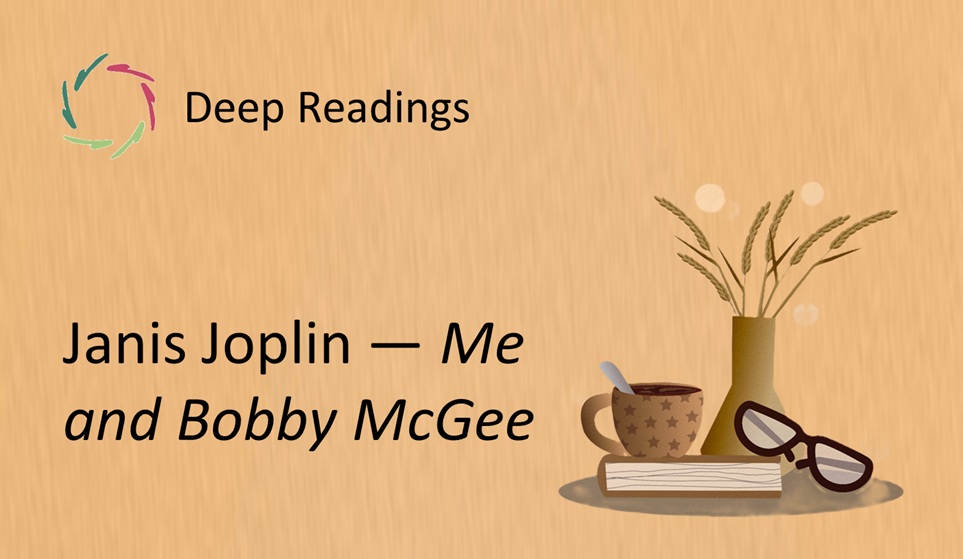Janis Joplin ― Me and Bobby McGee (1971)

The fragment
“Freedom’s just another word for nothin’ left to lose
Nothin’, it ain’t nothin’, honey, if it ain’t free”
(Copyright proof)
Read full lyrics → Genius
Listen → Janis Joplin on YouTube
Contextual glimpse
Written by Kris Kristofferson and Fred Foster, the song was first recorded in 1969, but it was Janis Joplin’s posthumous 1971 version on Pearl that made it iconic. The lyric tells the story of two drifters sharing a stretch of the open road — guitars, coffee, a battered freedom. They sing together through weather and miles, only to part when paths diverge.
Against this backdrop, the fragment is a distillation. It emerges after the journey has offered both joy and loss, carrying the taste of shared days and the ache of goodbye. Joplin’s performance balances grit and vulnerability, making the paradox of freedom — as gain and as absence — sound lived-in and true.
Resonance
The road in the song is both literal and inner: highways and trains outside, restlessness and longing inside. The fragment stands at the point where the two meet. Freedom here isn’t abstract; it’s the lived sensation of lightened hands after letting go of someone and someplace you loved.
From an Aurelian perspective, this is the pivot where autonomy becomes Inner Freedom. It’s not the escape from loss, but the refusal to let loss hollow you out. The journey shows that freedom can carry tenderness, and that letting go can keep you whole. The song’s verses give that truth a landscape — rain on denim, diesel fumes, laughter under a fading sun — so that the fragment is heard not as isolation, but as space made wide enough to hold both love and departure.
Why this may also be about you
You may not be hitching rides across Louisiana, but you’ve likely had your own Baton Rouge — a moment between one life and the next. The backpack might be emotional, the road symbolic, yet the choice is the same: hold on until your hands cramp, or let the wind take what’s not yours to keep.
This fragment speaks to the second choice. It invites you to see freedom not as running from, but as opening to what can come when the road ahead is uncluttered.
Lisa’s inspired, original idea about this fragment
Think of the whole song as a framed picture. The fragment is the title, and the rest is the painted scene: coffee steam in the morning, the blur of trees from a train window, the hum of a song half-sung. Without the picture, the title might feel bare; without the title, the picture might feel unanchored. Together, they hold the full sense — that freedom is sweeter when you’ve known what it means to be accompanied.
Echoes
Joplin’s version became the definitive one, influencing covers from Waylon Jennings to Pink. The line has been taken as a motto by travelers, rebels, and mourners alike. Yet in the context of the full song, it’s not a slogan but a tender summation. The echo in popular culture often strips it to bravado, but in Joplin’s voice, it carries the softness of a shared past.
The AURELIS blog on “Freedom of Being (Anything)” deepens this by showing how real freedom is not merely the lack of ties, but the presence of self-coherence. In this light, the fragment is an inner release, not a void.
Inner invitation
Hear the song in your mind from the first chord. Walk with its verses through towns and rain. Then arrive at the fragment, and let it rest in you. Notice if freedom feels like absence or like room.
Think of one place in your life where you’ve been “on the road” — maybe with someone, maybe alone. Ask what you’ve been carrying, and whether it’s still meant for your journey.
Closing note
This is about the human being you are: able to love without possession, to walk away without erasing what was shared. The road and the heart can both remain open.
Lisa’s final take
Letting go is how you keep the best part of the song.
Keywords
freedom, road, letting go, presence, companionship, departure, Inner Freedom, tenderness, resilience, paradox, coherence, travel, memory


